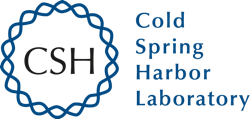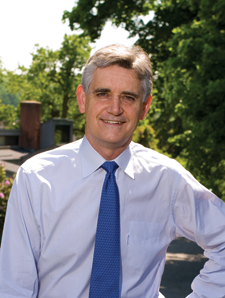Related Research Articles

James Dewey Watson is an American molecular biologist, geneticist, and zoologist. In 1953, he co-authored with Francis Crick the academic paper proposing the double helix structure of the DNA molecule. Watson, Crick and Maurice Wilkins were awarded the 1962 Nobel Prize in Physiology or Medicine "for their discoveries concerning the molecular structure of nucleic acids and its significance for information transfer in living material".

Cold Spring Harbor is a hamlet and census-designated place (CDP) in the Town of Huntington, in Suffolk County, on the North Shore of Long Island in New York. As of the 2010 United States census, the CDP population was 5,070.

Cold Spring Harbor Laboratory (CSHL) is a private, non-profit institution with research programs focusing on cancer, neuroscience, plant biology, genomics, and quantitative biology.
Joseph Frank Sambrook was a British molecular biologist known for his studies of DNA oncoviruses and the molecular biology of normal and cancerous cells.
Tom Maniatis, is an American professor of molecular and cellular biology. He is a professor at Columbia University, and serves as the Scientific Director and CEO of the New York Genome Center.

Representational oligonucleotide microarray analysis (ROMA) is a technique that was developed by Michael Wigler and Rob Lucito at the Cold Spring Harbor Laboratory (CSHL) in 2003. Wigler and Lucito currently run laboratories at CSHL using ROMA to explore genomic copy number variation in cancer and other genetic diseases.
Mark Bender Gerstein is an American scientist working in bioinformatics and Data Science. As of 2009, he is co-director of the Yale Computational Biology and Bioinformatics program.
Cold Spring Harbor Laboratory Press was founded in 1933 to aid in Cold Spring Harbor Laboratory's purpose of furthering the advance and spread of scientific knowledge.
Michael Howard Wigler is an American molecular biologist who has directed a laboratory at Cold Spring Harbor Laboratory since 1978 and is a member of the National Academy of Sciences. He is best known for developing methods to genetically engineer animal cells and his contributions to cancer, genomics and autism genetics.

Bruce William Stillman, AO, FAA, FRS is a biochemist and cancer researcher who has served as the Director of Cold Spring Harbor Laboratory (CSHL) since 1994 and President since 2003. He also served as the Director of its NCI-designated Cancer Center for 25 years from 1992 to 2016. During his leadership, CSHL has been ranked as the No. 1 institution in molecular biology and genetics research by Thomson Reuters. Stillman's research focuses on how chromosomes are duplicated in human cells and in yeast Saccharomyces cerevisiae; the mechanisms that ensure accurate inheritance of genetic material from one generation to the next; and how missteps in this process lead to cancer. For his accomplishments, Stillman has received numerous awards, including the Alfred P. Sloan, Jr. Prize in 2004 and the 2010 Louisa Gross Horwitz Prize, both of which he shared with Thomas J. Kelly of Memorial Sloan-Kettering Cancer Center, as well as the 2019 Canada Gairdner International Award for biomedical research, which he shared with John Diffley.
Adam C. Siepel is an American computational biologist known for his research in comparative genomics and population genetics, particularly the development of statistical methods and software tools for identifying evolutionarily conserved sequences. Siepel is currently Chair of the Simons Center for Quantitative Biology and Professor in the Watson School for Biological Sciences at Cold Spring Harbor Laboratory.

David L. Spector is a cell and molecular biologist best recognized for his research on gene expression and nuclear dynamics. He is currently a professor at Cold Spring Harbor Laboratory (CSHL). Since 2007, he has served as Director of Research of CSHL.

The McClintock Prize for Plant Genetics and Genome Studies is a prize awarded in genetics and genomics. The Prize is awarded by the Maize Genetics Executive Committee, and is presented to the Prize winner each spring at the Annual Maize Genetics Conference.
Robert Anthony Martienssen is a British plant biologist, Howard Hughes Medical Institute–Gordon and Betty Moore Foundation investigator, and professor at Cold Spring Harbor Laboratory, US.

Scott William Lowe is Chair of the Cancer Biology and Genetics Program in the Sloan Kettering Institute at Memorial Sloan Kettering Cancer Center. He is recognized for his research on the tumor suppressor gene, p53, which is mutated in nearly half of cancers.
Anne K. Churchland is a neuroscientist at University of California, Los Angeles. Her laboratory studies the function of the posterior parietal cortex in cognitive processes such as decision-making and multisensory integration. One of her discoveries is that individual neurons in rodent posterior parietal cortex can multitask i.e. play a role in multiple behaviors. Another discovery is that rodents are similar to humans in their ability to perform multisensory integration, i.e. to integrate stimuli from two different modalities such as vision and hearing.
Gregory James Hannon is a professor of molecular cancer biology and director of the Cancer Research UK Cambridge Institute at the University of Cambridge. He is a Fellow of Trinity College, Cambridge while also serving as a director of cancer genomics at the New York Genome Center and an adjunct professor at Cold Spring Harbor Laboratory.
Timothy Paul Tully is an American neurobiologist who is the chief scientific officer and executive vice president for research & development at the San Diego-based biotechnology company Dart Neuroscience. He is known for his research on the role of genetics in human memory. With the support of billionaire Ken Dart, he is also attempting to create a pharmaceutical drug that would give its takers a photographic memory, which has been dubbed "Viagra for the brain" by the media.

Adrian Robert Krainer is a Uruguayan-American biochemist and molecular geneticist known for his research into RNA gene-splicing. Krainer holds the St. Giles Foundation Professorship at Cold Spring Harbor Laboratory in Laurel Hollow, New York.

Zachary B. Lippman is an American plant biologist and the Jacob Goldfield Professor of Genetics at Cold Spring Harbor Laboratory and a member of the National Academy of Sciences Lippman has used gene editing technology to investigate the control of fruit production in various crops. In 2019 he was awarded a MacArthur Fellowship and in 2020 he received the National Academy of Sciences Prize in Food and Agriculture Sciences.
References
- ↑ "Thomas Gingeras". Cold Spring Harbor Laboratory. Retrieved 2020-02-22.
- ↑ Zimmer, Carl (2008-11-10). "Now: The Rest of the Genome". The New York Times. ISSN 0362-4331 . Retrieved 2020-02-22.
- ↑ "What is a Gene? - How ENCODE is Redefining Genetic Information - Thomas Gingeras". PSW Science. Retrieved 2020-02-22.
- ↑ Coghaln, Andy (2004-02-21). "Our genome 'reads' junk as well as genes". New Scientist. Retrieved 2020-02-22.
- ↑ "CSHL investigators rank among world's most highly cited". Cold Spring Harbor Laboratory. 2019-12-11. Retrieved 2020-02-22.
- ↑ Ryan Gingeras [@nords41] (30 January 2020). "I just discovered, thanks to Google Scholar, that 327 works cite something I've written. My father, by contrast, has been cited in 85,977 works. Seems a gotta a lot of work to do to catch up to my old man" (Tweet). Retrieved 8 January 2021– via Twitter.
- ↑ Gingeras, Ryan (2009). Sorrowful Shores: Violence, Ethnicity, and the End of the Ottoman Empire 1912-1923. OUP Oxford. p. ix. ISBN 978-0-19-156802-2.